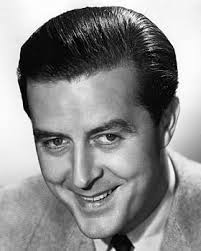Ray Milland
 Ray Milland (3 January 1907 – 10 March 1986) was a Welsh actor and director. His screen career ran from 1929 to 1985, and he is best remembered for his Academy Award–winning portrayal of an alcoholic writer in The Lost Weekend (1945), a sophisticated leading man opposite a corrupt John Wayne in Reap the Wild Wind (1942), the murder-plotting husband in Dial M for Murder (1954), and as Oliver Barrett III in Love Story (1970).
Ray Milland (3 January 1907 – 10 March 1986) was a Welsh actor and director. His screen career ran from 1929 to 1985, and he is best remembered for his Academy Award–winning portrayal of an alcoholic writer in The Lost Weekend (1945), a sophisticated leading man opposite a corrupt John Wayne in Reap the Wild Wind (1942), the murder-plotting husband in Dial M for Murder (1954), and as Oliver Barrett III in Love Story (1970).
Before becoming an actor, Milland served in the Household Cavalry of the British Army, becoming a proficient marksman, horse-rider, and aeroplane pilot. He left the army to follow a career in acting and appeared as an extra in several British productions before getting his first major role in The Flying Scotsman. This led to a nine-month contract with MGM and he moved to the United States where he appeared as a stock actor. After being released by MGM he was picked up by Paramount, who used Milland in a range of lesser speaking parts, normally as an English character. He was loaned out to Universal in 1936 for a film called Three Smart Girls, and its success saw Milland given a lead role in The Jungle Princess alongside new starlet Dorothy Lamour. The film was a big success and catapulted both to stardom. Milland remained with Paramount for almost 20 years, and as well as his Oscar winning role in The Lost Weekend, he is remembered for the films The Big Clock, The Major and the Minor, and The Thief, the last of which saw him nominated for a Golden Globe. After leaving Paramount, he began directing and ended his career moving into television.
Milland, who was at one time Paramount Pictures highest paid actor, co-starred alongside many of the most popular actresses of the time including Gene Tierney, Grace Kelly, Lana Turner, Marlene Dietrich, Ginger Rogers, Jane Wyman, Loretta Young, and Veronica Lake.
Before becoming an actor, Milland served in the Household Cavalry. An expert shot, he became a member of his company's rifle team, winning many prestigious competitions, including the Bisley Match in England. While stationed in London, Milland met dancer Margot St. Leger, and through her was introduced to American actress Estelle Brody.[7] Brody queried Milland's commitment to an army career, which led to Milland buying himself out of the forces in 1928 in the hope of becoming an actor.
His first appearance on film was as an uncredited extra on the Arnold Bennett film Piccadilly (1929). After some unproductive extra work, which never reached the screen, he took on the agent Frank Zeitlin on the recommendation of fellow fledgling actor Jack Raine. It was his reputed prowess as a marksman that earned him work as an extra at the British International Pictures studio on Arthur Robison's 1929 production of The Informer. While he was working on The Informer he was asked to test for a production being shot on a neighbouring stage. Milland made a good impression on director Castleton Knight and was hired for his first acting role as Jim Edwards, in The Flying Scotsman. Milland, in his autobiography, recalls that it was on this film that it was suggested he adopt a stage name; and chose Milland from the Mill lands area of his Welsh home town of Neath.
His work on The Flying Scotsman had impressed enough for him to be given a six-month contract, in which Milland starred in two more Knight directed films, The Lady from the Seaand The Plaything. Believing that his acting was poor, and that he had won his film roles through his looks alone, Milland decided to gain some stage work to improve his art. After hearing that club owner Bobby Page was financing a touring company, Milland approached him in hope of work. He was given the role of second lead, in a production of Sam Shipman and Max Marcin's The Woman in Room 13. Despite being released from the play after five weeks, Milland felt that he had gained valuable acting experience.
Source: Wikipedia

